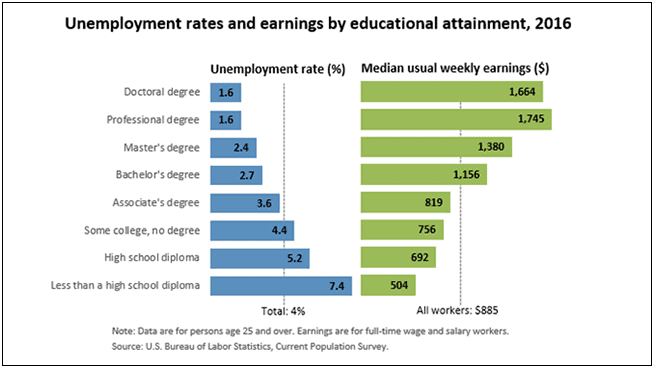The path to owning my own business started around 10 years ago. I graduated from high school and went on to college for business. I graduated, got a job as a financial analyst, and then around five years ago, completed my MBA with an emphasis in Finance. It seemed like a logical path – graduate…
The path to owning my own business started around 10 years ago. I graduated from high school and went on to college for business. I graduated, got a job as a financial analyst, and then around five years ago, completed my MBA with an emphasis in Finance.
 It seemed like a logical path – graduate from high school, go to college, get a job in that field, and then get my MBA to further my career opportunities.
It seemed like a logical path – graduate from high school, go to college, get a job in that field, and then get my MBA to further my career opportunities.
It was the path I fell into, and I never really gave it a second thought. For my MBA, I figured I needed it in order to be successful in the corporate finance world.
However, I’m now a full-time blogger.
One of the questions I’m often asked is if I regret going to school for so many college degrees (3). After all, it took a lot of time and led to a significant amount of debt.
I definitely did not learn a thing about blogging back in college, and an MBA isn’t 100% focused on the topic of starting your own specific business, especially a niche one. Plus, I did not get my MBA thinking that I would be starting my own business. I went for it to better my career opportunities.
Related content:
According to the U.S. Small Business Administration, there are 28.8 million small businesses in the United States, which make up 99.7% of all U.S. businesses. And, a huge number of the population are starting their own business and working for themselves.
But, does that mean they all need or have an MBA?
Remember, an MBA is not required when starting your own business. But, does that mean that those without an MBA do better or worse?
I researched to see what the value of an MBA is, and I was able to find a great chart from the U.S. Bureau of Labor Statistics about unemployment rates and earnings by educational attainment for 2016.
This data shows earnings for full-time wage and salary workers, but it doesn’t specify those who have started their own business. However, it does show that there is some value in a Master’s degree.

According to this chart, the unemployment rate is much lower for those with one or multiple college degrees. The median usual weekly earnings tends to increase as well.
However, according to a report released by the Harvard Business Review, most of the top business leaders in the world actually do NOT have MBAs. In fact, only 29 of the 100 best companies had executives with MBAs, and less than half of those received their MBA from an elite business school (think Harvard, Stanford, etc.).
Here’s a short list from Business Insider’s Top 100 Entrepreneurs Who Made Millions Without A College Degree:
- Walt Disney, founder of the Walt Disney Company, dropped out of high school at 16.
- Richard Branson, billionaire founder of Virgin Records, Virgin Atlantic Airways, Virgin Mobile, and more. He also dropped out of high school at 16.
- Rachael Ray, Food Network cooking show star, food industry entrepreneur, with no formal culinary arts training. She never attended college.
- Michael Dell, billionaire founder of Dell Computers, started his business out of his college dorm room, but he later dropped out of college.
- Larry Ellison, billionaire co-founder of Oracle software company. Ellison actually dropped out of two different colleges.
However, there are also many successful people who do have MBAs, such as Elon Musk, Michael Bloomberg, Sheryl Sandberg, and Dr. Oz.
So, should you get an MBA if you want to start your own business?
MBAs can be expensive.
An MBA can cost anywhere from $5,000 to well over $100,000 depending on what college you attend.
And, according to Poetsandquants.com, the cost of obtaining your MBA continues to rise.
New York University’s Stern School of Business costs over $200,000, Harvard Business School has a total two-year cost to $204,640, and Stanford University’s Graduate School of Business costs $210,838.
That is a TON of money in order to get your MBA.
I went to a moderately priced state university and received my MBA, and I think that it was a great value. However, if I had to pay over $200,000 to receive my MBA, I don’t know if it would be worthwhile. That’s a lot of money for not much real world experience that can be applied to a specific business idea.
And, let’s not forget about the amount of time it can take to receive your MBA.
For some students, they focus on their MBA full-time, which means that they aren’t bringing in an income, or they are bringing in significantly less than needed to sustain most living expenses. Some MBA students do work full-time, but they usually take a smaller course load.
I worked on my MBA full-time and worked full-time, which meant that I didn’t have time for pretty much anything else in life.
Plus, if you know that you want to start a business, the time it takes to get an MBA can make that goal that much farther away.
An MBA surrounds you with other determined people.
By earning your MBA, you’ll most likely be surrounded by a network full of people who are wanting to succeed in the business world.
This can help you build your future business idea, gain contacts that may help you and your business later on, and more.
I always say that networking is extremely important, and an MBA can definitely help you in that area.
An MBA won’t specifically teach you about the business you want to start.
An MBA will give you a pretty well rounded background on business in general. However, it won’t teach you everything you need to know about starting and sustaining your specific business plan.
This means that you will probably have to learn how to start your specific business elsewhere, such as researching your ideas and business plans outside of your MBA program.
For example, if you want to start a blogging business, you most likely won’t learn anything about a blogging while earning your MBA. The same goes for many other business ideas as most MBAs aren’t really focused on specific markets.
What they do offer is a good background on the actual “business” side of starting your own business, as discussed below.
You do learn about business, though.
While earning an MBA is more about business theory, it still offers you a lot of background information that can help you create your own business.
Through my MBA and the career I had as an analyst, I learned about business accounting, business law, managing a business, economics, business finances, marketing, advertising, and more. These are all things you should know about when running your own business. Sure, you can outsource a lot of these tasks, but for most start-ups, you may personally have to take on many of these tasks, especially in the beginning.
My analyst position also taught me a lot about running a profitable business, since I dealt with successful business owners every day.
There are a lot of times that my education and work experience have helped me run my own business. And, I am extremely grateful because it has helped me run my business extremely well.
According to Investopedia, around 30% of new businesses fail during the first two years of being open, 50% during the first five years, and 66% during the first 10 years.
Some of the reasons for failure that are cited in the above article include:
- Business owners not investigating the market.
- Business owners have problems with their business plan.
- A bad location, bad internet presence, and bad marketing for the business.
These are all things that are taught, in general, when working on your MBA, which can be great background knowledge for someone wanting to start their own business.
What about real experience?
I believe that real experience is the best. However, with an MBA, you can receive a well rounded education that can help you to launch a successful business.
You can learn how to manage a team, understand business specific finances, research the best business plan, and more.
When put together with real experience, I think that an MBA can be a great learning tool.
Does that mean that everyone should get their MBA?
No. Everyone is different, but I do believe that my MBA has helped me manage my own business.
What do you think? Should a person who wants to start a business get their MBA? If you’re already a business owner, do you have one? Why or why not?
